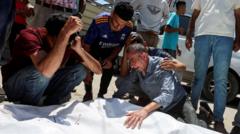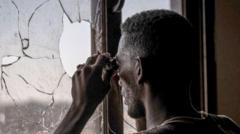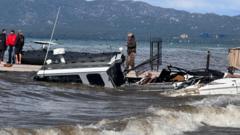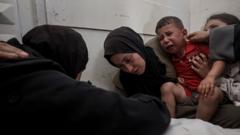In a tragic turn of events, the Democratic Republic of Congo's capital, Kinshasa, is struggling to cope with devastating floods that have resulted in numerous fatalities and widespread destruction. Over the past few days, heavy rains have caused the Ndjili River to overflow, inundating roads and homes across the city of 17 million residents.
**Deadly Floods Devastate Kinshasa, DRC, Amid Ongoing Humanitarian Crisis**

**Deadly Floods Devastate Kinshasa, DRC, Amid Ongoing Humanitarian Crisis**
Torrential rains in Kinshasa have resulted in widespread flooding, leaving dozens dead and thousands displaced in the Congolese capital.
Government reports indicate that at least 33 individuals have lost their lives, with officials anticipating the death toll to rise as floodwaters begin to recede. Significant infrastructure was impacted, including Lumumba Boulevard, the primary artery to the airport, which has been rendered impassable. Thousands have been uprooted from their homes, forced to seek refuge in temporary shelters.
Recent years have seen Kinshasa and other areas in Africa increasingly affected by severe weather phenomena attributed to climate change. Last year, the country experienced its most devastating floods in six decades, resulting in over 300 deaths and displacing nearly 280,000 households. The ongoing humanitarian crisis has been compounded by conflict in the eastern regions, leading to additional displacements and suffering among the local population.
President Felix Tshisekedi visited flood-stricken areas, pledging aid and support for displaced families. He highlighted the challenges posed by illegal settlements in vulnerable areas, exacerbating the disaster's impact. Many survivors, such as Denise Sukali, are grappling with the loss of their homes while seeking shelter in makeshift accommodations.
With a humanitarian assistance budget reliant on foreign support, recent fluctuations in aid are threatening the survival of millions. The United States alone has contributed significantly to crisis relief efforts, but recent funding cuts could jeopardize food and medical assistance for around 8 million individuals at risk of hunger and malnutrition.
As Kinshasa navigates this challenging natural disaster amidst instability, the struggle for survival continues for many families in the region.
Recent years have seen Kinshasa and other areas in Africa increasingly affected by severe weather phenomena attributed to climate change. Last year, the country experienced its most devastating floods in six decades, resulting in over 300 deaths and displacing nearly 280,000 households. The ongoing humanitarian crisis has been compounded by conflict in the eastern regions, leading to additional displacements and suffering among the local population.
President Felix Tshisekedi visited flood-stricken areas, pledging aid and support for displaced families. He highlighted the challenges posed by illegal settlements in vulnerable areas, exacerbating the disaster's impact. Many survivors, such as Denise Sukali, are grappling with the loss of their homes while seeking shelter in makeshift accommodations.
With a humanitarian assistance budget reliant on foreign support, recent fluctuations in aid are threatening the survival of millions. The United States alone has contributed significantly to crisis relief efforts, but recent funding cuts could jeopardize food and medical assistance for around 8 million individuals at risk of hunger and malnutrition.
As Kinshasa navigates this challenging natural disaster amidst instability, the struggle for survival continues for many families in the region.






















